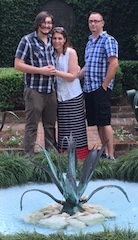At 11am on the day before graduation, Brett-Michael Green’s eyes are heavy. He hasn’t had any sleep for the last 36 hours, and his folks arrive from Pensacola tonight to watch him march.
“My mom, dad, and uncle will be here later today. They’re staying at my place for tomorrow’s graduation ceremonies. My roommate moved out early, so I have an extra bedroom. And we don’t have to deal with parking tomorrow because I live so close to campus we can all walk. Everything worked out just right!”
Green came to FSU in 2014, after completing his Associates degree with an eye toward a physics undergraduate major at the University of West Florida. He credits UWF with introducing him to a broad set of physics principles in the two years he was there. After he decided to attend FSU, he also did some research into what majors and courses would make him most employable after graduation.
“After looking at jobs I was interested in, I decided that one of the typical science disciplines wasn’t what I was looking for. I talked to many science students and they weren’t able to write efficient code even though they were in computer science or math. What I wanted was the flexibility to apply science and to be able to solve my physics problems on the computer. The third day I was here, I was standing outside Dirac and saw a big sign on the fourth floor that said Department of Scientific Computing, so I came up and talked to the students about the program and found it was exactly what I was looking for. Computational science really has no limits on the type of things you can do. You can do large arrays or graphs, or web development -- really whatever you want or your problem demands.”
While a student, Green was industrious; at various times he was an entrepreneur, held positions as a consultant and programmer, and did a research project that was part of the department’s annual Xposition. He was able to excel at all these undertakings, and he especially impressed Bin Chen, who mentored his Xposition project. When asked about Green’s work and abilities, Chen stated, “[He] successfully ran his simulation code on the HPC cluster …. which clearly demonstrates his ability in mastering parallel computing techniques and utilizing modern computing facilities. I was very impressed by his overall performance, in particular, his programming skills. The Department of Scientific Computing did a wonderful job in training him.”
Additionally, he has a wide set of interests, including virtual reality, augmented reality, CGI, computer vision, cinema, simulation, parallelization, physics, differential geometry, astronomy, and symmetry; he especially enjoyed Xiaoqiang Wang’s scientific visualization class and believes the department’s colloquiums are particularly worthwhile. “The colloquiums here are very important. They have to stay. They get people involved in research and are clearly interdisciplinary. Connecting with chemistry, physics, biology help us think about applying computational tools to a wide variety of problems.”
Now that his undergraduate degree is behind him, Green plans to move to the Florida panhandle to continue in a senior position at a small company he has been working with for the last year or so.
“Right now, I’m working for a company in the panhandle with a startup that works on defense projects that are science based. That’s where I’m moving and what I’ll be doing full time after I graduate.”
Where ever he is, you can bet Green will be learning, solving problems, and having fun.
“I’ve always been a good questioner, and have always been curious about problems and how to solve them. It’s an adventure. It’s fun.”


